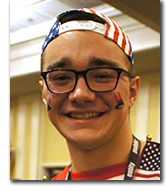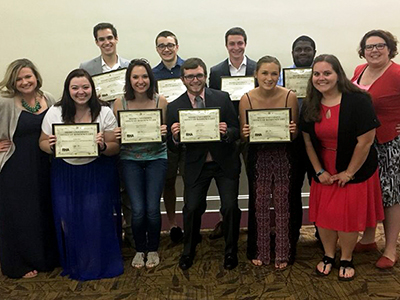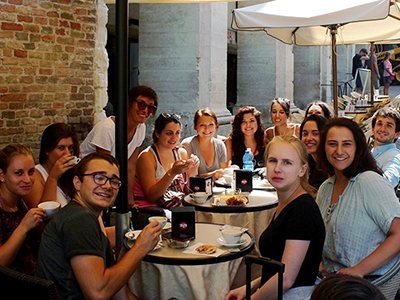Jacob Bruggeman (Class of 2019)

- honors sophomore double major in History and Political Science
- from Brunswick, OH
- College of Arts and Science Ambassador and Undergraduate Associate (UA)
- Resident Assistant (RA) in Brandon Hall; former Hall President (Dennison Hall); former Executive Board Member (Residence Hall Association)
- studied abroad in Urbino, Italy (Summer 2016)
- Ohio Public Leader Fellow (2017)
"Take advantage of the countless opportunities around you. Attend a lecture on what appears to be an obscure topic, go into a professor's office hours, sit in on a poetry reading. In taking advantage of these opportunities, you'll make new connections, expose yourself to new perspectives, and challenge the way you think about the world."
Why Miami?
"Of all the schools I applied to, Miami was just the best decision. I came to a Make it Miami admissions event and met with retired professor of Italian Dr. Sante Matteo, and his thoughtfulness and candor solidified my decision to attend Miami. Miamians constantly talk about the university's engaging and renowned faculty, and it's very true! All the faculty that I talked to that day were just amazing.

Jacob Bruggeman prepares tiramisu while studying abroad in Urbino, Itlay.
"I was telling Dr. Matteo that I was going to major in history, maybe political science, though I wasn't yet sure. He suggested that I take Italian, and that conversation ended up being the catalyst that ultimately led me to study Italian at Miami and then study abroad in Urbino, Italy this past summer.
"I felt comfortable at Miami right off the bat, and I think the reason is that I got involved fairly quickly. I took advantage of office hours, just going in and hanging out to get to know the faculty a little bit. I did this with my advisor, history professor, and department chair Wietse de Boer, as well as with other history faculty like Aaron Cavin, Charlotte Goldy, Stephen Norris, Elena Albarrán, and some professors I didn't even have in class. And that's just the history faculty! In Harrison Hall I have pestered political science professors Ryan Barilleaux and Mark Morris countless times.
"Developing relationships with Miami's outstanding faculty is, in my view, an essential step to success in college. In building a network of mentors, you pool together people who want to see you succeed, people who will write you recommendation letters, people who will vouch for you. My relationship with Dr. Cavin, for example, has led to a undergraduate research experience — an experience for which I have been awarded funding this year through the Undergraduate Research Awards Program, and through which I can better advocate for myself professionally. In essence, Miami's faculty are people you need to succeed, and they're fun folks, too.
"While I was considering political science as my second major after history, I was placed in the political science University Studies (UNV) 101 class, which is a freshman seminar. It was led by Undergraduate Associate (and poli sci major) Maggie Reilly, and my experience in that great class prompted me to apply to the Undergraduate Associate Program to become a UA myself — which I am this year, for two classes: UNV 101 and POL 201W.
"As a UA, I find that incoming students hold many stereotypes about this campus and their peers. These stereotypes are incomplete stories. Miami students are really smart people, and they're engaged on so many levels: in academics, Greek life, student organizations, internships, even national politics. Miami's student body is filled with outstanding individuals, and I cherish each instance in which I've engaged with them. I appreciate that the university puts a lot of effort and resources into providing opportunities for its students, such as study abroad programs, around 720 student organizations, the huge number of guest speakers, lots of free events, and of course the amazing faculty. I wish more students would appreciate these opportunities — they're going on all the time!"
Best Miami Experiences

RHA Executive Board at the end-of-the-year awards cermony. Jacob Bruggeman is in the back row, second from left.
"Student engagement is what sparked my passion; and I continue to love working with other students. One of the most formative experiences I've had at Miami was being the hall president of Dennison Hall last year, which ultimately led to my position on the Residence Hall Association (RHA) Executive Board and my position as a Resident Assistant (RA) at Brandon Hall this year.
"When I came to Miami, Dennison had just been renovated, and we were the first students to live there. I ran for hall president and began going to general assembly meetings. That November, I was elected as the RHA's national communications coordinator. In this role, where I was the only first year student on the executive board, I put together delegations for national conferences and presided over the funding body of the Living Learning Communities. I also traveled to DC for a conference and helped negotiate our $100,000 movie channel contract. On top of that, I organized (though was unable to attend) Miami's delegation for the National Association of College and University Residence Halls (NACURH) annual conference at the University of Delaware.
"On the academic side, I've had great interactions with faculty in classes and at independent lectures and events. All of the faculty I mentioned earlier fall into this category, and I always look forward to dropping in during their office hours, taking more of their classes, and just chatting with them.
"Aaron Cavin in the history department has been a very strong positive influence during my independent study with him — not only as a general mentor, but as an extra pair of eyes on my work. I cannot thank him enough for the countless hours we've spent in his office brainstorming, researching, and sharing great stories.
"Finally, I really loved my intensive Italian study abroad trip to Urbino, Italy last summer. Urbino is not only a European cultural capital, but the ideal Renaissance city. It has a very rich history, having served as the model for culture during the Renaissance and establishing the relationship between artists and rulers. Raphael was born there, so there's a deep artistic background, and Urbino is home to one of the most renowned art schools in Europe — probably the world."
Miami and the Liberal Arts
"There is no substitute for a liberal arts curriculum. Sometimes there are hoops to jump through, such as the Miami Plan, but you would be hard-pressed to find a CAS major that isn't represented by well-rounded, developed people in terms of their interests and worldly perspectives. Part of that is being able to understand others' points of view, to develop this ability for empathy. I think that is so much more important in the College of Arts and Science than in other schools on campus.
"I'm an outgoing, confident person, so I've learned to spin myself very well. Part of that comes from being able to contextualize data, which in turn comes from the skill sets my history and political science majors have developed. Contextualization is a valuable skill for assessing situations and problem solving. In a historical situation you need to be able to see the contingencies between people and their actions, events and their outcomes — in essence, how these things are interrelated. This is also important in business and leadership. Coursework in my two majors almost always focuses on the big picture, but historians and political scientists really can't be successful in these academic pursuits unless they hold a magnifying glass to the details. My majors have developed my ability to analyze people and data in this way.
"I think a liberal arts curriculum also develops your brain to pursue different paths of inquiry. For example, in looking at some snapshot of history, a Miami Plan geology class I had to take might lead me to wonder how soil composition has affected unrest in an area. In point of fact, if a region's soil composition had, over time, become poorly suited to growing crops and foodstuffs, this may have added to an already increasing civil unrest, which may have led a society towards revolution. I think it's invaluable to be able to form these paths of inquiry and to contextualize in this way, for this ability leads to innovative thinking. I love this aspect of my majors.
"What I like most about my majors is their applicability. Both disciplines are so important. Looking at politics, we are being shaped right now by the results of the 2016 election, so political science seeks to understand more immediate changes. History, however, continues to convulse our culture on a deeper, grander scale. Think of tectonic plates and the almost unnoticeable movement with which they change our world; history moves us in the same way. Both disciplines, though, are essential to living well and having a better understanding of how the world around us works."
Summer in a Prominent Cultural Capital
"The director for Miami's Intensive Italian study abroad program is Nicoletta Pazzaglia, a visiting assistant professor in the Department of French and Italian. Her program is conducted in Urbino, Italy, and she talked about it all year in our classes, saying it was a great way to get our language requirement completed over the summer. That's 8 credit hours, plus 1 hour of a required cultural competency class. I decided to go for it!

Jacob Bruggeman (closest to camera) enjoys an outdoor cafe in Italy, with fellow study abroad students.
"The program began in early June for a total of 7 weeks, and I stayed for an extra week so my family would be able to come and visit. There were about a dozen Miami students in the program, and we could often take 3-day weekends to travel — as long as the workforces operating the trains were not on strike! We traveled to Florence, Perugia, Venice, and many other cities during those amazing 7 weeks, but Urbino itself is just so beautiful. It's full of picturesque Renaissance-era architecture and stunning views. I would often go to one of the city's ramparts overlooking a valley and read; from there you could watch the sun rise and set, seeing its light fall upon the green of the valley.
"Our intensive Italian classes, all oral language practice, were held in the mornings on Monday through Thursday, plus a couple of Fridays. Each morning I would get up at 7 am, cook breakfast, leave for class early to read for about an hour, and then have class until about lunchtime. At this point in the day we'd all go home or out to lunch, and then the day was ours. Sometimes we would take a bus to a nearby beach, go hiking around the hills surrounding Urbino, or just tour the beautiful city itself. We also did a lot of our own cooking in the evenings!
"For the cultural competency portion, we wrote a weekly blog and presented it to the class. One week's blog topic was culture shock, and another topic was the differences between American and Italian values. Dr. Pazzaglia was the only Miami faculty in Urbino, but there was also a business legal studies professor who came and hung out with us for a week.
"I lived on the 4th floor of an apartment with two Miami students and an Italian art professor who taught in Urbino. Our apartment was a few hundred feet downhill from the city center, so we had easy access to the hustle and bustle of the city."
Advice to Students
"The skill sets that are developed through studying — no matter your major — will be essential tools in your future careers and become the lenses through which you view the world. You must know your abilities and skills, for this makes it easier to advocate for yourself in interviews, debates, and in the world at-large. Take a good look at what you've done in school and take inventory of the skills you've developed, and then make sure you're able to point to where you've developed these skills. The goal of a liberal arts curriculum is to prepare you for continuous learning, to always be furthering your understanding, for a lifetime of growth.
"You also need to look at extracurricular activities. There is nothing more enriching in college than being involved with something, whether it's an organization or charity event — just something meaningful beyond your classes. If study abroad is feasible for you, then do it. It will be a lot harder to do something like that after college, since right now you have less responsibilities. Miami offers tons of resources and options, including scholarships if a trip is not financially accessible. Faculty are willing to help you seek out and apply to scholarships as long as you're ready.
"Finally, take advantage of the countless opportunities around you. Attend a lecture on what appears to be an obscure topic, go into a professor's office hours, sit in on a poetry reading. In taking advantage of these opportunities, you'll make new connections, expose yourself to new perspectives, and challenge the way you think about the world.
"Do all you can, get involved, study abroad, take an extra class. Doing these things will transform your Miami experience into something formative and worthwhile, and I believe such a transformation is necessary for a fulfilling post-Miami personal life and professional career!"
[November 2016]

